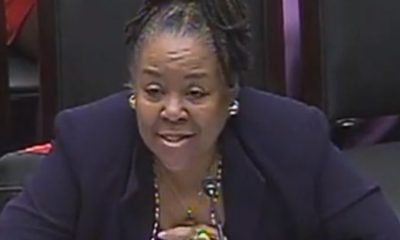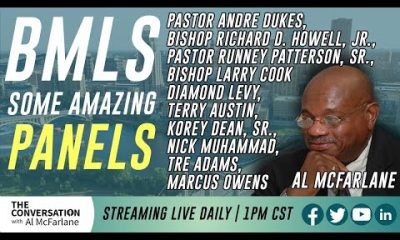Black History
COMMENTARY: Baltimore Must Change
THE AFRO — The United States of America was birthed in White supremacy, which, for the greater part of U.S. history, was affirmed again and again through law and custom. That contradiction – “land of the free, home of the enslaved” – was also evident in Baltimore, a city – like the rest of the country – of racial disparities.
By A. Adar Ayira, Special to AFRO
“… [people of African ancestry]…are not included, and were not intended to be included, under the word ‘citizens’ in the Constitution, and can therefore claim none of the rights and privileges which that instrument provides for and secures to citizens of the United States. On the contrary, they were at that time considered as a subordinate and inferior class of beings, who had been subjugated by the dominant race, and, whether emancipated or not, yet remained subject to their authority, and had no rights or privileges but such as those who held the power and the Government might choose to grant them.”
~ Roger B. Taney, Chief Justice, United States Supreme Court, March 1857, Dred Scott vs. Sanford
The United States of America was birthed in White supremacy, which, for the greater part of U.S. history, was affirmed again and again through law and custom.
That contradiction – “land of the free, home of the enslaved” – was also evident in Baltimore, a city – like the rest of the country – of racial disparities, including:
African-American citizens being disproportionately victims of traffic stops, jail sentences, and use of force by police; African Americans carrying disproportionately more debt, including school loan debt; Housing segregation – and development to affordable housing – remains a seemingly intractable issue, stifling opportunities for asset development in Baltimore’s African American communities.
It is almost cliché at this point to continue sharing racialized disparities – because so many people either know or live them – or to offer theories of change. Many Baltimoreans are jaded, having seen change efforts come and go.
Along with jadedness, however, there is also hope and resolve. That is what Associated Black Charities continues to see in its partners and within Baltimore communities. ABC works with individuals and institutions that refuse to accept less than a vision of a Baltimore that includes everyone; where everyone has equitable opportunities to thrive; and where all our communities are not only valued but invested.
Because of this, ABC’s agenda incorporates both transactional and transformational strategies.
Many agencies and nonprofits focus on transactional strategies: those that meet immediate and concrete needs of individuals, families, and communities. These are the strategies that are funded by foundations and donors; the types of strategies that are well-understood and easily explainable and that offer “proof of works” (“..we fed 3,000 people this year…”; “we provided housing for 1,200 families…”; or “we trained 600 people who now have jobs…”).
Transactional strategies are fundable because donors can immediately see the impacts and outcomes of their financial support.
However, transactional strategies often bypass the transformational by maintaining and sustaining the status quo: current structures and systems and money and services. Transactional strategies serve a variety of purposes: meeting the basic needs of enough individuals to keep citizens from even more social unrest; giving financial supporters an outlet for charitable giving (and tax write-offs); and keeping social justice movements within the prescribed parameters of comfort of the monied class in exchange for grants/donations.
They keep a lid on social movements that look to address root causes; that serve to disrupt the way things are to create a more inclusive vision of equity that would essentially decrease the need for transactional programs.
ABC, while recognizing the need for transactional strategies that assist individuals and communities with current needs, also realizes that in order to achieve a more equitable society, we must address the root causes that create racialized inequities. Because of this, ABC also focuses on transformational strategies, using a Racial Equity Lens that acknowledges the structural and institutional race-based barriers that continue to operate in American society. We recognize that “silver rights” are just as important as Civil Rights and pursue an agenda to stabilize and expand economic viability in African-American communities in Baltimore. This includes:
Educational advocacy regarding the use of a Racial Equity Lens in policy. ABC understands that policy has never been “universalist” – assuming that everyone has equal access and opportunity – but has always been race-based, damaging not only those specific racial groups for whom policy has erected barriers, but also racial majority populations by generating losses on economic and material productivity,
Institutional support regarding the use of a Racial Equity Lens. The workforce in Maryland for workers 40 and under is now close to “majority-minority.” For businesses to thrive in Maryland, they must have more of an understanding of barriers facing workers of color, as well as opportunities for growth and productivity that those workers can afford them.
ABC’s charge is to change the future. Transactional strategies alone will only serve to support our present. Baltimore – and the state — must look ahead to transform our policies and practices if our children are going to thrive in the 21st Century, and ABC is there to lead and assist in those conversations and that work.
Disclaimer: The views and opinions expressed in this article do not necessarily reflect the official policy or position of The Afro-American Newspapers.
This article originally appeared in The Afro.
Activism
Oakland Post: Week of April 24 – 30, 2024
The printed Weekly Edition of the Oakland Post: Week of April 24 – 30, 2024

To enlarge your view of this issue, use the slider, magnifying glass icon or full page icon in the lower right corner of the browser window. ![]()
Activism
Oakland Post: Week of April 17 – 23, 2024
The printed Weekly Edition of the Oakland Post: Week of April 17 – 23, 2024

To enlarge your view of this issue, use the slider, magnifying glass icon or full page icon in the lower right corner of the browser window. ![]()
Black History
Matthew Henson: Explorer Extraordinaire
Matthew Henson, a trailblazing explorer who overcame countless obstacles to leave an incredible mark on history. Born on August 8, 1866, in Charles County, Maryland, his journey is a testament to the power of determination and the spirit of adventure.

By Tamara Shiloh
Matthew Henson, a trailblazing explorer who overcame countless obstacles to leave an incredible mark on history. Born on August 8, 1866, in Charles County, Maryland, his journey is a testament to the power of determination and the spirit of adventure.
Henson’s life began amidst the backdrop of post-Civil War America, where opportunities for African Americans were scarce. From a young age, he possessed an insatiable curiosity about the world beyond his small town. At the age of 12, he embarked on a journey that would change the course of his life forever when he joined a merchant ship as a cabin boy.
His most famous expedition was his journey to the Arctic with renowned explorer Robert E. Peary. In 1887, Henson joined Peary’s crew as a seaman and quickly proved himself to be invaluable with his skills as a navigator and craftsman. Over the course of several expeditions, Matthew endured extreme cold, treacherous terrain, and grueling conditions as he and Peary sought to reach the elusive North Pole.
In 1908–09, Peary set out on his eighth attempt to reach the North Pole. It was a big expedition, with Peary planning to leave supplies along the way. When he and Henson boarded their ship, the Roosevelt, leaving Greenland on August 18, 1909, they were joined by a large group. This included 22 Inuit men, 17 Inuit women, 10 children, 246 dogs, 70 tons of whale meat, blubber from 50 walruses, hunting gear, and tons of coal.
In February, Henson and Peary left their anchored ship at Ellesmere Island’s Cape Sheridan, along with the Inuit men and 130 dogs. They worked together to set up a trail and supplies along the way to the Pole.
Peary picked Henson and four Inuit people to join him in the final push to the Pole. However, before they reached their destination, Peary couldn’t walk anymore and had to ride in a dog sled. He sent Henson ahead to scout the way. In a later interview with a newspaper, Henson recalled being in the lead and realizing they had gone too far. The group turned back, and Henson noticed his footprints helped guide them to their destination. At that location, Henson planted the American flag.
Henson’s legacy extends far beyond his expeditions to the Arctic. He shattered racial barriers in the world of exploration and inspired countless individuals, regardless of race, to dream big and pursue their passions. In 1937, he was finally recognized for his achievements when he was inducted into The Explorers Club, an organization dedicated to promoting scientific exploration and field research.
Matthew Henson died in the Bronx, New York, on March 9, 1955, at the age of 88.
-

 Community2 weeks ago
Community2 weeks agoFinancial Assistance Bill for Descendants of Enslaved Persons to Help Them Purchase, Own, or Maintain a Home
-

 Activism4 weeks ago
Activism4 weeks agoOakland Post: Week of April 3 – 6, 2024
-

 Business2 weeks ago
Business2 weeks agoV.P. Kamala Harris: Americans With Criminal Records Will Soon Be Eligible for SBA Loans
-

 Community2 weeks ago
Community2 weeks agoAG Bonta Says Oakland School Leaders Should Comply with State Laws to Avoid ‘Disparate Harm’ When Closing or Merging Schools
-

 Activism3 weeks ago
Activism3 weeks agoOakland Post: Week of April 10 – 16, 2024
-

 Community2 weeks ago
Community2 weeks agoOakland WNBA Player to be Inducted Into Hall of Fame
-

 Community2 weeks ago
Community2 weeks agoRichmond Nonprofit Helps Ex-Felons Get Back on Their Feet
-

 Community2 weeks ago
Community2 weeks agoRPAL to Rename Technology Center for Retired Police Captain Arthur Lee Johnson






















































